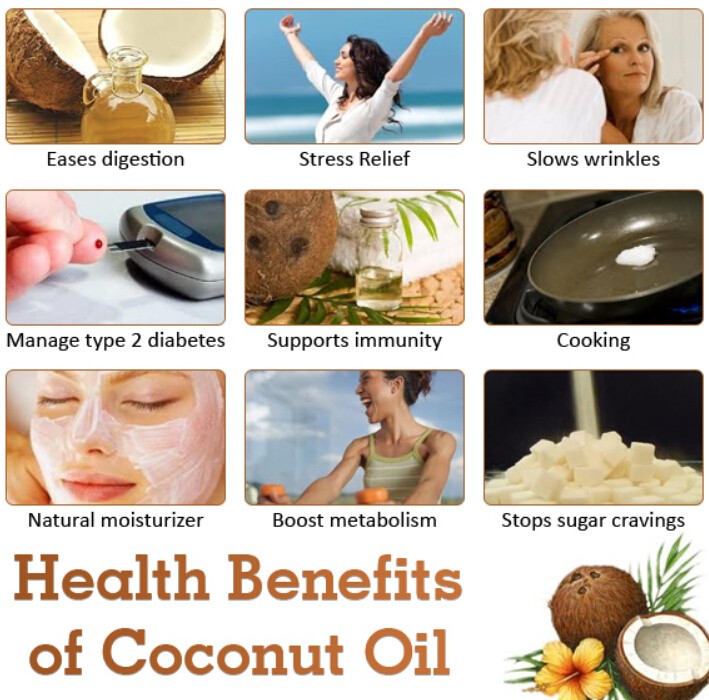Coconut oil is a type of oil extracted from the meat of mature coconuts harvested from the coconut palm tree. It is commonly used in cooking and baking as a healthy alternative to other oils, such as vegetables or canola. In recent years, it has gained popularity in the Western world as a superfood with numerous health benefits. This oil is extracted from the meat of mature coconuts. Studies have shown that consuming coconut oil can improve cardiovascular health, weight loss, and even brain function. This article will discuss 18 amazing health benefits of coconut oil.

Nutritional Value of Coconut Oil
Coconut oil is primarily composed of saturated fats, which make up about 90% of its total fatty acid content. While saturated fats have been traditionally associated with negative health effects, recent research suggests that the saturated fats in coconut oil may differ from those found in animal-based products.
One tablespoon (14 grams) of coconut oil contains approximately:
- Calories: 121
- Total Fat: 14 grams
- Saturated Fat: 12 grams
- Monounsaturated Fat: 1 gram
- Polyunsaturated Fat: 0.2 grams
Coconut oil is free from cholesterol and contains no trans fats. It also contains small amounts of vitamins E and K, as well as traces of iron.
18 Amazing Health Benefits of Coconut Oil
1. Boosts Energy and Metabolism
Coconut oil is rich in medium-chain triglycerides (MCTs), a type of fatty acid that is easily absorbed and metabolized by the body. Unlike long-chain fatty acids, MCTs are quickly converted into energy, providing a natural boost to your metabolism and energy levels.
Many people report feeling more energized and alert after incorporating coconut oil into their diets. This makes it a popular choice for those seeking a natural energy boost without the crash associated with caffeine or sugar.
2. Supports Weight Management
Contrary to popular belief, not all fats are created equal. The MCTs found in coconut oil have been shown to promote feelings of fullness and may help regulate appetite. So It is easier to maintain a healthy weight.
Additionally, coconut oil has been found to increase the body’s ability to burn fat for energy, a process known as thermogenesis. This metabolic boost can contribute to weight loss or maintenance efforts when combined with a balanced diet and regular exercise.
3. Improves Cognitive Function
The unique fatty acid composition of coconut oil, particularly its high concentration of MCTs, has been linked to improved cognitive function and brain health.
MCTs are easily converted into ketones. This can serve as an alternative energy source for the brain, potentially improving focus, memory, and overall cognitive performance.
Some studies have even suggested that coconut oil may have neuroprotective effects. This makes it a potential ally in the prevention and management of neurodegenerative conditions like Alzheimer’s disease.
4. Supports Heart Health
Despite its high saturated fat content, coconut oil has been shown to have a neutral or even beneficial effect on heart health. This is due to the unique structure of the fatty acids found in coconut oil.
Additionally, coconut oil has been found to improve cholesterol levels by increasing HDL (good) cholesterol and decreasing LDL (bad) cholesterol, further supporting cardiovascular health.

5. Enhances Skin Health
Coconut oil has long been used as a natural moisturizer and skin care product, and for good reason. Its unique fatty acid composition and antioxidant properties make it an excellent choice for nourishing and protecting the skin.
The lauric acid found in coconut oil has antimicrobial and anti-inflammatory properties. It can help soothe and heal various skin conditions, such as eczema, psoriasis, and acne. Additionally, coconut oil can help improve skin hydration, elasticity, and overall radiance.
6. Promotes Healthy Hair
Just as it benefits the skin, coconut oil can work wonders for your hair. Its moisturizing properties can help nourish and strengthen hair strands, reducing breakage and promoting healthy growth.
Many people use coconut oil as a deep conditioning treatment or as a natural alternative to commercial hair products. Its antimicrobial properties may also help combat scalp issues like dandruff and fungal infections.
7. Supports Immune Function
Coconut oil is rich in lauric acid, a medium-chain fatty acid with potent antimicrobial and antiviral properties. This unique compound has been shown to help fight off harmful pathogens, including bacteria, viruses, and fungi, supporting a strong and resilient immune system.
Additionally, the anti-inflammatory properties of coconut oil may help regulate the immune response. This can reduce the risk of chronic inflammation and associated health issues.
8. Aids Digestion and Nutrient Absorption
The MCTs found in coconut oil are easily digested and absorbed by the body. This makes them a gentle and nourishing choice for those with digestive issues or malabsorption concerns.
Coconut oil has also been found to support the growth of beneficial gut bacteria, promoting a healthy gut microbiome and improving overall digestive function. This, in turn, can enhance nutrient absorption and support overall health and well-being.
9. Reduces Inflammation
Chronic inflammation is a contributing factor to many health issues, including arthritis, autoimmune disorders, and even certain types of cancer.
Coconut oil contains powerful anti-inflammatory compounds, such as antioxidants and polyphenols. This can help reduce inflammation throughout the body.
By incorporating coconut oil into your diet or using it topically, you may be able to alleviate inflammation-related symptoms and support overall health and well-being.

10. Supports Oral Health
Coconut oil has been used for centuries in traditional practices for promoting oral health, and modern research is beginning to validate these claims. The lauric acid found in coconut oil has antimicrobial properties that can help combat harmful bacteria in the mouth. This can reduce the risk of tooth decay, gum disease, and bad breath.
Many people practice “oil pulling,” a traditional Ayurvedic technique that involves swishing coconut oil in the mouth for several minutes to remove toxins and promote oral hygiene.
11. Enhances Bone Health
Coconut oil contains a unique combination of nutrients that may support bone health and prevent osteoporosis. Its high content of antioxidants, such as vitamin E and polyphenols, can help protect bone cells from oxidative stress and inflammation.
Additionally, coconut oil is a good source of minerals like calcium and magnesium. It is essential for maintaining strong and healthy bones.
12. Improves Thyroid Function
The thyroid gland plays a crucial role in regulating metabolism, energy levels, and overall health. Coconut oil has been found to support thyroid function by providing a source of healthy fats and antioxidants.
Some studies have suggested that coconut oil may help improve thyroid hormone levels and reduce inflammation in the thyroid gland, potentially alleviating symptoms associated with thyroid disorders.
13. Supports Healthy Pregnancy
Coconut oil is a rich source of essential fatty acids and nutrients that are important for fetal development and maternal health during pregnancy. Its anti-inflammatory properties may also help alleviate common pregnancy-related issues, such as morning sickness and swelling.
Additionally, coconut oil has been found to support breast milk production and quality, providing valuable nutrients for the growing baby.

14. Enhances Exercise Performance
For those who lead an active lifestyle, coconut oil may provide a natural boost to exercise performance and recovery. The MCTs found in coconut oil can serve as a readily available source of energy, providing sustained fuel for physical activity.
Additionally, coconut oil’s anti-inflammatory properties may help reduce muscle soreness and promote faster recovery after intense workouts or training sessions.
15. Supports Respiratory Health
Coconut oil has been used traditionally as a natural remedy for respiratory issues, and modern research is beginning to validate its potential benefits.
The lauric acid found in coconut oil has antimicrobial and antiviral properties. It may help combat respiratory infections and support overall respiratory health.
Additionally, coconut oil’s anti-inflammatory properties may help alleviate symptoms associated with conditions like asthma and bronchitis. This can promote easier breathing and improved respiratory function.
16. Promotes Healthy Aging
As we age, our bodies become more susceptible to oxidative stress and inflammation, which can contribute to various age-related health issues. Coconut oil’s rich antioxidant content and anti-inflammatory properties may help combat these processes, supporting healthy aging and reducing the risk of age-related diseases.
By incorporating coconut oil into your diet and lifestyle, you may be able to promote longevity and maintain overall health and well-being as you age.
17. Enhances Dental Health
In addition to its benefits for oral health, coconut oil may also support dental health by promoting strong and healthy teeth. The lauric acid found in coconut oil has antimicrobial properties that can help combat harmful bacteria in the mouth. This can reduce the risk of tooth decay and gum disease.
Additionally, coconut oil’s anti-inflammatory properties may help alleviate inflammation and swelling in the gums, promoting overall dental health and hygiene.
18. Versatile and Sustainable
One of the most appealing aspects of coconut oil is its versatility and sustainability. It can be used for cooking, baking, and even as a natural beauty product, making it a valuable addition to any household.
Furthermore, coconut oil is a renewable and environmentally friendly resource, as coconut palms are highly sustainable and require minimal resources to grow and produce fruit.

How to Incorporate Coconut Oil into Your Diet?
Here are some tips for adding coconut oil to your daily meals:
- Cooking: Coconut oil can be used instead of other oils or butter when cooking or baking. It has a high smoke point, so it can be heated to high temperatures without producing harmful compounds.
- Smoothies: Add a tablespoon of coconut oil to your smoothie for an extra boost of healthy fats and a creamy texture.
- Coffee or Tea: Adding a teaspoon of coconut oil to your coffee or tea can help boost energy levels and provide a natural sweetness.
- Salad Dressing: Use coconut oil instead of other oils when making homemade salad dressings.
- Toast: Spread coconut oil on toast instead of butter or jam for a healthy and tasty alternative.
- Stir-fries: Use coconut oil as the cooking oil when making stir-fries for a subtle tropical flavor.
- Baked Goods: Substitute coconut oil for butter or other oils when making baked goods for a healthier and more flavorful option.
Can coconut oil be used for cooking?
Yes, coconut oil is a popular cooking oil due to its high smoke point, which means it can withstand high heat without breaking down and producing harmful compounds. It adds a unique flavor to dishes and is commonly used in various cuisines, especially in tropical regions.
Is all coconut oil the same?
No, there are different types of coconut oil available in the market. Virgin coconut oil is extracted from fresh coconut meat using minimal processing and is considered to be of higher quality.
Refined coconut oil undergoes additional processing and may have a milder taste. It’s important to choose high-quality coconut oil for the best potential benefits.
Precautions when consuming Coconut oil
While coconut oil has many health benefits, there are some precautions to keep in mind when consuming it:
- Moderation is key: Like with any food, consuming too much coconut oil can lead to weight gain and other health issues. Limiting your intake to 1-2 tablespoons per day is recommended.
- Avoid hydrogenated coconut oil: Hydrogenated coconut oil has been processed with hydrogen and contains trans fats, which are unhealthy for our bodies. Make sure to choose unrefined, virgin, or cold-pressed coconut oil.
- Allergy concerns: While coconut oil is not considered a common allergen, some people may still experience an allergic reaction. If you have a tree nut allergy, it’s best to consult your doctor before consuming coconut oil.
- Consider your cooking method: Coconut oil has a low smoke point, which means it can burn at high temperatures. It is best to use it for low to medium-heat cooking, baking, or finishing oil.
Conclusion
Coconut oil is a versatile and healthy oil that offers numerous health benefits. It can help boost the immune system, aid digestion, promote heart health, reduce inflammation, and support skin and hair health, among other benefits.
Incorporating coconut oil into your diet and daily routine can be an easy and delicious way to enjoy these benefits and improve your overall health and well-being.






